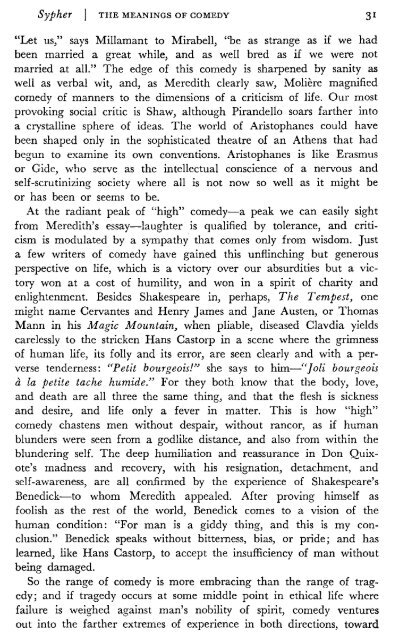The Meanings of Comedy* - Shakespeare Navigators
The Meanings of Comedy* - Shakespeare Navigators
The Meanings of Comedy* - Shakespeare Navigators
Create successful ePaper yourself
Turn your PDF publications into a flip-book with our unique Google optimized e-Paper software.
Sypher I rHo MEANTNGS oF coMEDY<br />
3I<br />
"Let usr" says Millamant to Mirabell, "be as strange as if we had<br />
been married a great while, and as well bred as if we were not<br />
married at all." <strong>The</strong> edge <strong>of</strong> this comedy is sharpened by sanity as<br />
well as verbal wit, and, as Meredith clearly saw, Molidre magnified<br />
comedy <strong>of</strong> manners to the dimensions <strong>of</strong> a criticism <strong>of</strong> life. Our most<br />
provoking social critic is Shaw, although Pirandello soars farther into<br />
a crystalline sphere <strong>of</strong> ideas. <strong>The</strong> world <strong>of</strong> Aristophanes could have<br />
been shaped only in the sophisticated theatre <strong>of</strong> an Athens that had<br />
begun to examine its own conventions. Aristophanes is like Erasmus<br />
or Gide, who serve as the intellectual conscience <strong>of</strong> a nervous and<br />
self-scrutinizing society where all is not now so well as it might be<br />
or has been or seems to be.<br />
At the radiant peak <strong>of</strong> "high" comedy-a peak we can easily sight<br />
from Meredith's essay-laughter is qualified by tolerance, and criticism<br />
is modulated by a sympathy that comes onJy from wisdom. Just<br />
a few writers <strong>of</strong> comedy have gained this unflinching but generous<br />
perspective on life, which is a victory over our absurdities but a victory<br />
won at a cost <strong>of</strong> humility, and won in a spirit <strong>of</strong> charity and<br />
enlightenment. Besides <strong>Shakespeare</strong> in, perhaps, <strong>The</strong> Ternperf, one<br />
might name Cervantes and Henry James and Jane Austen, or Thomas<br />
Mann in his Magic Mountai,n, when pliable, diseased Clavdia yields<br />
carelessly to the stricken llans Castorp in a scene where the grimness<br />
<strong>of</strong> human life, its folly and its error, are seen clearly and with a perverse<br />
tenderness: "Petit bourgeois!" she says to him-"/oli bourgeois<br />
d Ia petite tache humide." For they both know that the body, love,<br />
and death are all three the same thing, and that the flesh is sickness<br />
and desire, and life only a fever in matter. This is how "high"<br />
comedy chastens men without despair, without rancor, as if human<br />
blunders were seen from a godlike distance, and also from within the<br />
blundering self. <strong>The</strong> deep humiliation and reassurance in Don Quixote's<br />
madness and recovery, with his resignation, detachment, and<br />
self-awareness, are all confirmed by the experience <strong>of</strong> <strong>Shakespeare</strong>'s<br />
Benedick-to whom Meredith appealed. After proving himself as<br />
foolish as the rest <strong>of</strong> the rvorld, Benedick comes to a vision <strong>of</strong> the<br />
human condition: "For man is a giddy thing, and this is my conclusion."<br />
Benedick speaks without bitterness, bias, or pride; and has<br />
learned, like Hans Castorp, to accept the irxufficiency <strong>of</strong> man without<br />
being damaged.<br />
So the range <strong>of</strong> comedy is more embracing than the range <strong>of</strong> tragedy;<br />
and if tragedy occurs at some middle point in ethical life where<br />
failure is weighed against man's nobility <strong>of</strong> spirit, comedy ventures<br />
out into the farther extremes <strong>of</strong> experience in both directions. toward


